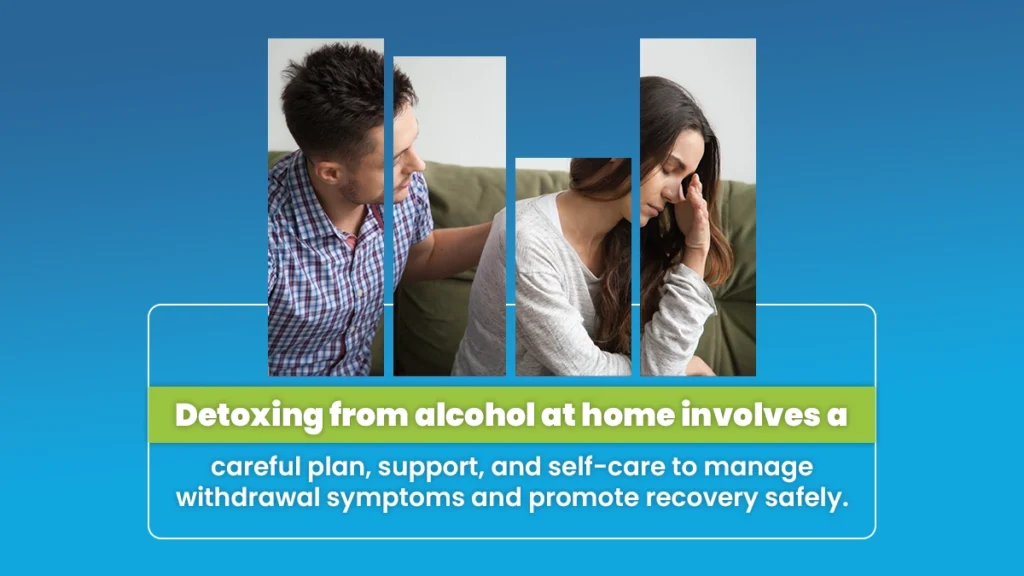Detoxing from alcohol at home can be a challenging yet rewarding journey. Many people choose to detox at home for various reasons, including privacy, comfort, and the ability to manage their environment. However, it’s essential to approach this process with care and knowledge.
This article will explore tips for making the at-home detox process safer and more effective. Remember, while home detox can be effective for some, it’s crucial to consult with an addiction specialist, especially if you have a history of chronic alcohol use or related health issues.
Key Takeaways
At-home alcohol detox can be a challenging but achievable process that requires careful planning and support. Here is what this article covers:
- Preparing for alcohol home detox involves assessing your needs and consulting a healthcare professional to ensure safety.
- Creating a safe space and being aware of potential withdrawal symptoms will help you manage the detox process effectively.
- Focusing on nutrition, emotional support, and post-detox care is vital for a successful recovery and long-term sobriety.
The Haven Detox-New England provides professional treatment needed to overcome alcohol use disorder (AUD). Dial (844) 933-4145 to learn about available treatment options.

Preparing For At-Home Alcohol Detox
Preparing for at-home alcohol detox is a crucial step for a successful recovery. Taking the time to plan can make the process easier and safer.
Assessing The Need For Detox
Before starting detox, it’s essential to assess your drinking habits. Ask yourself how much and how often you drink. Recognizing the need for change is vital. If you notice that alcohol negatively affects your life, it may be time to detox. Understanding your relationship with alcohol helps set clear goals.
Consulting A Healthcare Professional
Consulting a healthcare professional is a key part of preparing for detox. They can offer valuable medical advice and support. A doctor can help assess your overall health and manage withdrawal symptoms. Their expertise ensures that you know what to expect during the detox process.
Creating A Support System
Creating a support system is crucial for a successful detox. Contact friends, family members, or support groups who understand your journey. Having people around you can provide encouragement and accountability. Sharing your goals with others makes the detox process feel less lonely.
Setting Up A Safe Environment
Setting up a safe environment is essential for a successful at-home alcohol detox. A supportive space can help you stay focused on your recovery.
Stocking Necessary Supplies
First, stock up on necessary supplies for your detox. This includes water, healthy snacks, herbal teas, and any detox medications a doctor prescribes. Keeping these items on hand ensures that you stay nourished and hydrated. Journals, books, or calming music are also helpful for relaxation.
Removing Temptations
Next, remove temptations from your surroundings. Clear out any alcoholic drinks and items related to drinking. This can include bottles, glasses, and mixers. By creating a space free from triggers, you lessen the chances of giving in to alcohol cravings. A clean environment supports your commitment to sobriety.
Planning For Comfort
Lastly, plan for comfort during your detox. Create a cozy space with blankets, pillows, and favorite items that make you feel safe. Consider setting up a quiet area for meditation or relaxation. A comfortable environment aids in managing withdrawal symptoms and promotes a sense of well-being.
Managing Alcohol Withdrawal Symptoms
Managing symptoms of alcohol withdrawal is an essential part of detoxing at home. Knowing what to expect can assist you in coping better during this challenging time.
Common Withdrawal Symptoms
First, it’s essential to understand common withdrawal symptoms. These may include:
- Anxiety
- Tremors
- Sweating
- Nausea and vomiting
- Insomnia
- Irritability
- Mood swings
- Increased heart rate
Recognizing these symptoms helps you prepare for what may happen as your body adjusts to the absence of alcohol.
Tips For Symptom Relief
Several tips can help relieve a range of withdrawal symptoms. Staying hydrated is crucial, so drink plenty of water. Eating nutritious foods can also provide energy and improve your mood. Light exercise, such as walking or jogging, can help reduce anxiety. Additionally, deep breathing and meditation techniques may help calm your mind and body. Also, take any medications as prescribed by a doctor.
When To Seek Medical Help
Knowing when to seek professional help is vital during the self-detox process. If symptoms become severe or unmanageable, contact a healthcare professional immediately. Signs that you should seek medical care include extreme confusion, seizures, hallucinations, or severe depression. Getting support from a doctor can ensure your safety and provide the care you need.
Nutrition And Hydration
Nutrition and hydration play vital roles in your recovery during self-detoxing. Eating well and staying hydrated can support your body and mind.
Importance Of Hydration
Hydration is crucial during detox because it helps your body function properly. Drinking enough water can ease withdrawal symptoms like headaches and fatigue. Aim to drink plenty of fluids daily, such as water, herbal teas, or electrolyte drinks. Staying hydrated can lift your energy levels and improve your mood, making detox more manageable.
Healthy Dietary Choices
Making healthy dietary choices is also important for recovery. Eat well-balanced meals, including fruits, vegetables, whole grains, and lean proteins. These foods provide essential nutrients that help your body heal. Refrain from processed foods and sugars, as they can lead to energy crashes. Eating well supports your overall health and makes it easier to resist cravings.
Supplements That May Help
Certain supplements may help during detox. Vitamins like B-complex and C can support your body’s recovery. Magnesium can assist in reducing anxiety and improve sleep. Additionally, omega-3 fatty acids support brain function and mood. Always consult a medical professional before adding supplements to your detox diet to ensure they are safe.
Mental And Emotional Support
Mental and emotional support is crucial during alcohol detox. Coping with your challenges can make a significant difference in your recovery journey.
Coping With Cravings
Coping with cravings is a common challenge during detox. It’s crucial to have strategies in place to manage these urges. When cravings hit, distract yourself with activities like reading, walking, or talking to a friend. Keep reminding yourself of your goals and why you chose to detox. Journaling about your feelings can also help you process emotions and understand triggers.
Stress Management Techniques
Using stress management techniques can make a big difference in your recovery journey. Deep breath exercises and meditation can help calm your mind. Physical activities like yoga or gentle stretching can reduce tension. Find hobbies or creative outlets that bring you joy and relaxation. Prioritizing self-care is vital to maintaining your mental health during detoxification.
Utilizing Therapy And Support Groups
Utilizing therapy and support groups can provide additional help. Talking therapies like cognitive behavioral therapy (CBT) can teach you skills to change negative thoughts and behaviors associated with alcohol dependence. Participating in a local support group like Alcoholics Anonymous (AA) connects you with others who understand your journey. Sharing your experiences and learning from others can offer encouragement and strength.
Potential Risks And When To Get Help
Understanding the potential risks during alcohol detox is vital for safety. Awareness of serious withdrawal symptoms can help you know when to seek help.
Serious Withdrawal Symptoms
Serious withdrawal symptoms can arise during detox. These symptoms may include severe anxiety, intense shaking, or extreme sweating. In some cases, those undergoing detox treatment may experience hallucinations or confusion. If you notice these symptoms becoming worse, it’s important to seek help immediately. Recognizing when things are getting out of hand is key to staying safe.
Understanding Delirium Tremens (DTs)
Delirium tremens (DT) is a severe form of alcohol withdrawal that can be life-threatening. Symptoms may include confusion, severe agitation, and seizures. DTs usually manifest within 48 to 72 hours after the last drink. If you notice any of these symptoms, call for emergency help immediately. Early treatment can prevent complications and ensure your safety.
Emergency Planning
Emergency planning is essential during detoxification. Have a plan in place for what to do if severe symptoms occur. Make a list of contacts, including healthcare professionals and support people. Keep emergency numbers handy and ensure someone knows your situation. Planning offers peace of mind and ensures you can get help when needed.
Post-Detox Care
After completing home alcohol detox, it’s important to focus on post-detox care. This helps you maintain your sobriety and supports your ongoing alcohol addiction recovery process.
Maintaining Sobriety
Maintaining sobriety is the most crucial goal after detox. To achieve this, identify your triggers and develop strategies to avoid them. Create a plan for when cravings arise, such as engaging in a hobby or contacting a friend. Stay dedicated to your decision and remind yourself of the benefits of being sober. Celebrate your milestones to stay motivated on your journey.
Establishing A Routine
Establishing a routine can help create structure in your life. A regular schedule gives you a sense of purpose and keeps you focused. Include healthy activities like exercise, hobbies, and meal planning in your routine. Having a set plan can reduce stress and anxiety, making it easier to stay sober. Consistency in your daily life helps you build stability.
Building A Support Network
Building a support network is vital for ongoing recovery. Surround yourself with friends and family who understand your journey and encourage you. Join online communities or support groups, like SMART Recovery, to share experiences and gain advice. Connecting with others with similar goals will provide comfort and motivation as you continue to sobriety.
Frequently Asked Questions (FAQ)
How long does it take to reset your body from alcohol?
Resetting your body from alcohol can take varying amounts of time, depending on several factors. Generally, it may take about 1 to 3 months for your body to start feeling the positive effects of sobriety.
- Within one week, you might notice improved sleep and reduced cravings.
- After one month, your liver function improves, and your energy levels may increase.
- By three months, many individuals experience better mood, improved mental clarity, and overall physical health.
Everyone’s journey is different, and individual results may vary based on lifestyle and personal circumstances.
How do you completely remove alcohol from your body?
The best method to remove alcohol from your body is to stop drinking entirely. The liver processes alcohol at about one standard drink per hour. Staying hydrated by drinking a lot of water helps flush out toxins more effectively. Eating nutritious foods can support liver health and aid in recovery.
Getting enough sleep and engaging in regular physical exercise also promotes overall well-being. Medical supervision may sometimes be required, especially during the withdrawal phase. Seeking support from healthcare professionals or support groups can provide guidance and ensure a safe detox process.
Reinvent Yourself At The Haven Detox-New England
At The Haven Detox-New England, we offer compassionate support for those struggling with alcoholism. Our comprehensive services are designed to help you overcome your challenges and regain control of your life.
At our specialized drug addiction treatment facility, we offer a medical detox program to safely rid your body of harmful substances and prepare for the next step in your recovery journey: a residential treatment program. Here, you will experience a mix of therapies, medications, peer support, and nutritional guidance tailored just for you. Plus, if your alcohol abuse has led you to develop mental health problems, our dual diagnosis program provides the support you need.Don’t wait to start your recovery. Call us today at (844) 933-4145 to take the first step. You deserve a high quality of life, and we are here to guide you every step of the way.
Verify Insurance
Let’s get you or a loved one help with a few simple steps.
-
Mental Illness Treatment




